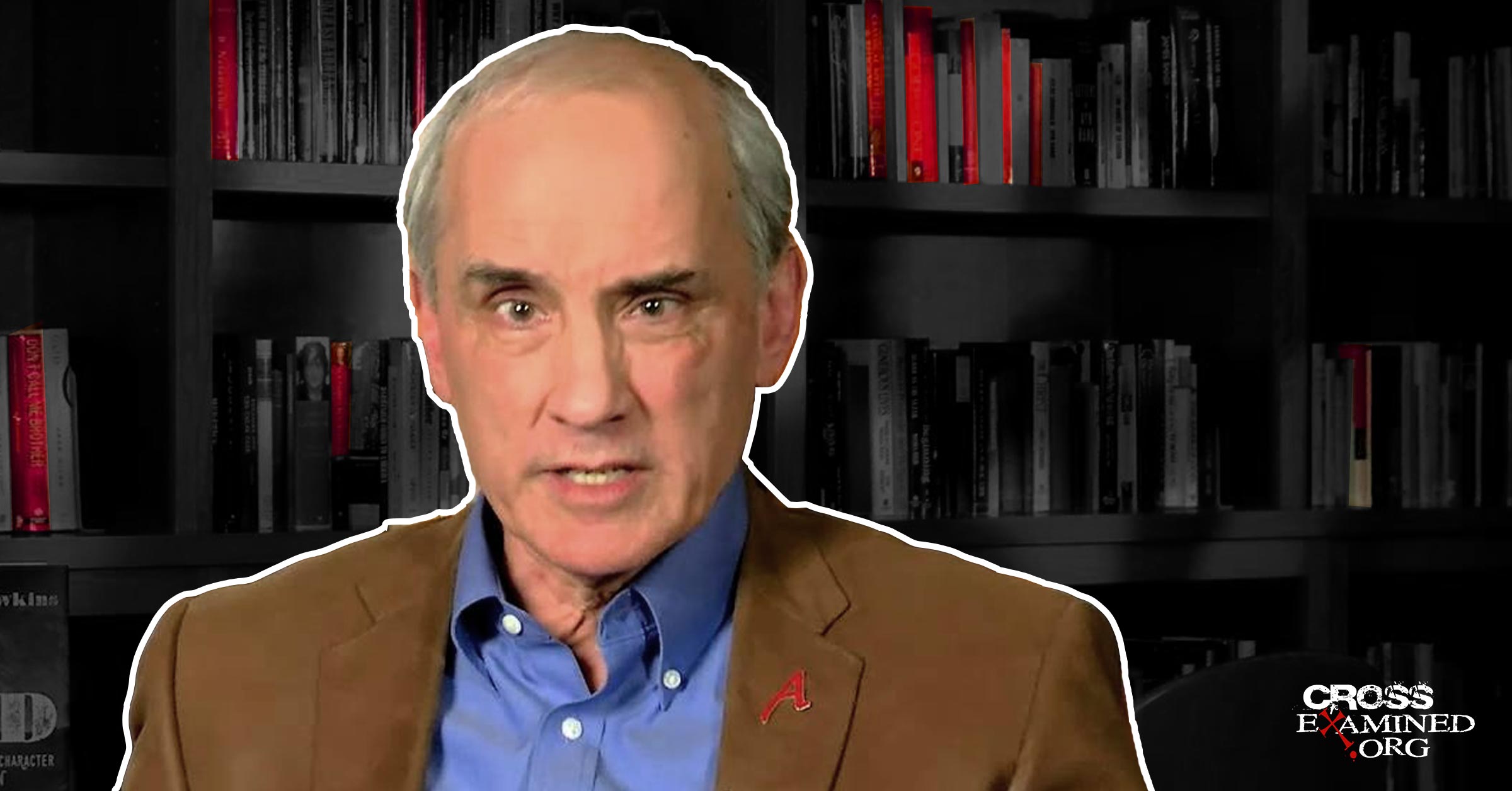Not one to let a good crisis go to waste, former minister and atheist activist Dan Barker tells us that the coronavirus proves that the Christian God doesn’t exist. Why? Because God promises to answer prayer. People have prayed for COVID-19 to stop. The virus continues to spread and people continue to die. Therefore Christianity must be false. Here’s Barker in his own words:
The Christian god makes a crystal-clear pledge: “I will answer your prayers.”
Jesus stated boldly: “All things, whatsoever ye shall ask in prayer, believing, ye shall receive.”(Matthew 21:22) There is no ambiguity here. “All things” means “all things.” He even clarified: “Even if you say to this mountain, ‘Be lifted up and thrown into the sea,’ it will be done.”
Jesus, who said “I and the Father are one,” confirmed this in many other passages: “So I tell you, whatever you ask for in prayer, believe that you have received it, and it will be yours.” — Mark 11:24
Barker multiplies many other prayer promises from the Four Gospels. Then he goes on:
The claim is indisputable. The omnipotent and omnibenevolent Christian god promises to answer “everyone who asks,” “all things,” “whatever you ask for in prayer.” If a believing Christian prays, then “it will be done for you,” “you shall receive,” “it will be yours,” “I will do it.”
There is no more solid promise in scripture.
The Christian god vows to answer prayer not with “Yes, No, or Wait,” as some apologists claim. He promises an unequivocal “Yes.”
Can Prayer Alone Fix Everything?
Barker is right about one thing. No passage in Scripture says ‘yes’ ‘no’ or ‘wait.’ But notice that Barker only emphasizes the ‘whatever you ask’ part in these verses. But he conveniently says nothing about the ‘believe that you receive it’ portions.
According to Barker’s strange reading of these texts, if we ask God for anything, it should immediately be performed. But that’s not how any of this works. Jesus didn’t indiscriminately heal anyone and everyone in the Gospels. We read in Mark 6:1-6 that Jesus could barely heal anyone in his hometown, Nazareth. Why? Mark says it was because of their unbelief. While in Nazareth, he went on to say in Luke 4:23-27 that there were plenty of lepers in Israel during the time of Elisha, but it was only Naaman the Syrian who was healed.
Repeatedly throughout the Gospels, Jesus healed individuals in response to their faith. See Mark 5:34, Luke 17:19, Luke 18:42, Matthew 8:13, Matthew 15:28 for just a few samples. Faith then must play a major factor. No one in the Gospels approached Jesus and said, “Hey Jesus. While you’re healing people, why not heal Israel of all their sicknesses?”
This would’ve convinced the Pharisees, the Sadducees, the High Priest, Pilate, Herod, and so forth. But that’s not the way God chose to operate. It is unlikely to have turned them into true worshipers but opportunists. And he’s not going to override his own word or his own divine nature. He expects people to respond in persistent, heartfelt faith.
It’s interesting that repeatedly in the Gospels, Jesus would command people to not tell of the miracles they experienced. (Mark 7:31-37, 9:2-9, Luke 5:12-15, 8:49-56). He also didn’t perform signs when the Pharisees and scribes demanded one. (Matthew 12:38-41) God gives enough evidence for those who want to believe can, but leaves enough ambiguity for those who want to go their own way can do so.
Barker continues:
Multitudes of Christians have been fervently praying. The Jesuits have asked Jesus to “Heal those who are sick with the virus.” The Christian relief organization World Vision is asking Almighty God to “keep this new coronavirus from continuing to spread.” The Southern Baptists are entreating “Lord, you are the Great Physician, so we pray for healing for the victims of COVID-19.” President Trump’s spiritual adviser Paula White said: “I believe in the same way if we call on God Almighty to divinely intervene just as He does so many times, that the plague can be stopped.”
So why are thousands continuing to succumb indiscriminately to the coronavirus? The tragic deaths include devout believers, as well as ministers, priests, and bishops. They are beseeching their Lord for protection, but the impudent virus, no respecter of persons, is recklessly cavorting around the planet oblivious to their beliefs.
Prayer Isn’t A Cure-All And Jesus Never Said That It Was
All this shows is that, at best, the Jesuits, World Vision, the Southern Baptists, etc. are praying unscripturally. Receiving answers to prayer, more often than not, is a matter between the individual and God. There’s nothing wrong with asking God to intervene for others, but I don’t think these leaders are expecting this pandemic to miraculously stop in its tracks, independently from God using people.
I can’t pray for God to keep my entire city free from COVID-19 anymore than I can pray for God to stop every traffic accident, cure every cancer, every heart disease, every stroke, every influenza, and every case of diabetes. You get the idea.
If God allowed that, we would live in a consequence-free world where God was orchestrating tens of thousands of miracles each day. My prayers cannot necessarily sober up every drunk driver, cause every person to make healthy choices, or keep college students from congregating on Florida beaches during spring break, or prevent some Chinese people from eating bats (or acting irresponsibly in a lab) or prevent the World Health Organization from initially advising against closing Chinese borders.
Because we live in a world where natural laws work in predictable ways, diseases can spread, and accidents can happen. Solomon was right when he wrote, “When a man’s folly brings his way to ruin, his heart rages against the LORD.” (Proverbs 19:3)
Is The Coronavirus A Judgment From God?
So is this virus a judgment from God? Barker points out that some Christian ministers have said that it is.
Rev. Ralph Drollinger, the evangelical pastor who conducts bible study at the White House for President Trump’s cabinet, blames the coronavirus on sin: “Whenever an individual or corporate group of individuals violate the inviolate precepts of God’s Word, he, she, they or the institution will suffer the respective consequences,” he wrote. “Most assuredly America is facing this form of God’s judgment.”
Some Christians preach that prayer is contingent. Natural disasters are actually punishments from God, they proclaim. He doesn’t answer prayer at the moment because America has turned its back on him.
Now, I haven’t looked into Drollinger said in context. But we all have seen ministers get on TV and blame people for disasters. And these Christian leaders are an embarrassment to me and many other believers. Barker would be rightly appalled. Notice that Jesus dealt with a similar situation in the Gospels:
Now there was some present at that time who told Jesus about the Galileans whose blood Pilate had mixed with their sacrifices. Jesus answered, “Do you think that these Galileans were worse sinners than all the other Galileans because they suffered this way? I tell you, no! But unless you repent, you too will all perish. Or those eighteen who died when the tower in Siloam fell on them—do you think they were more guilty than all the others living in Jerusalem? I tell you, no! But unless you repent, you too will all perish.
Jesus And The Problem Of Suffering
I’m sure this isn’t going to be popular, but Jesus didn’t say that tragedies befall people because they were worse sinners than anyone. But He said they were sinners nonetheless and unless we repent, we’ll likewise perish. The wages of sin is death, but God’s gift is eternal life for those who trust in Jesus. (Romans 6:23)
DA Carson’s commentary on Luke 13:1-5 is so insightful that I’ll quote it here at length:
First, Jesus does not assume that those who suffered under Pilate, or those who were killed in the collapse of the tower, did not deserve their fate. Indeed, the fact that he can tell those contemporaries that unless they repent they too will perish shows that Jesus assumes that all death is in one way or another the result of sin, and therefore deserved.
Second, Jesus does insist that death by such means is no evidence whatsoever that those who suffer in this way are any more wicked than those who escape such a fate. The assumption seems to be that all deserve to die. If some die under a barbarous governor, and others in a tragic accident, it is not more than they deserve. But that does not mean that others deserve any less. Rather, the implication is that it is only God’s mercy that has kept them alive. There is certainly no moral superiority on their part.
Third, Jesus treats wars and natural disasters not as agenda items in a discussion of the mysterious ways of God, but as incentives to repentance. It is as if he is saying that God uses disaster as a megaphone to call attention to our guilt and destination, to the imminence of his righteous judgment if he sees no repentance. This is an argument developed at great length in Amos 4. Disaster is a call to repentance. Jesus might have added (as he does elsewhere) that peace and tranquility, which we do not deserve, show us God’s goodness and forbearance.
It is a mark of our lostness that we invert these two. We think we deserve the times of blessing and prosperity, and that the times of war and disaster are not only unfair but come perilously close to calling into question God’s goodness or his power—even, perhaps, his very existence. Jesus simply did not see it that way.
Bingo. Barker goes on to say that God is the ‘most unpleasant character in all fiction’ but it seems like Barker is upset that God judges sin. It’s as if Barker thinks God should wink at people living like Canaanites and never punish anyone. But according to Barker, God should prove himself by instantaneously healing every person on the planet on demand, or else we should conclude He isn’t real!
CS Lewis right when he wrote, “What would really satisfy us would be a God who said of anything we happened to like doing, ‘What does it matter so long as they are contented?’ We want, in fact, not so much a Father in Heaven as a grandfather in heaven — a senile benevolence who, as they say, ‘liked to see young people enjoying themselves,’ and whose plan for the universe was simply that it might be truly said at the end of each day, ‘a good time was had by all.”
Jesus Is Still In The Healing Business
No, suffering and death are in the world because of sin. Jesus said disasters are a reminder of this, and unless we repent, we’ll also perish. And yet, Jesus still goes about “doing good and healing all those that are oppressed by the devil” in response to faith. (Acts 10:38) Barker says God isn’t healing anyone during this pandemic. But just ask this Georgia man, who claims God healed him of COVID-19. Or this woman that was given up for dead. Even the doctors remarked that something miraculous happened.
I personally know a person in my congregation whose 80-year father was in a nursing home that contracted the disease. Their dad was made completely well within a short time after prayer was made. Or what would Barker say to all the healings documented by Craig Keener’s scholarly two-volume work Miracles: The Credibility of the New Testament Accounts?
So no, Barker is wrong. The coronavirus isn’t “virulent enough to single-handedly kill the Christian God.” As a former pastor, he should know that he is twisting scripture and using the tragedy to stand on his favorite soapbox.
Recommended resources related to the topic:
If God, Why Evil? (DVD Set), (MP3 Set), and (mp4 Download Set) by Frank Turek
If God Why Evil. Why Natural Disasters (PowerPoint download) by Frank Turek
Why Doesn’t God Intervene More? (DVD Set), (MP3 Set), and (mp4 Download Set) by Frank Turek
Why does God allow Bad Things to Happen to Good People? (DVD) and (mp4 Download) by Frank Turek
Erik Manning is a Reasonable Faith Chapter Director located in Cedar Rapids, Iowa. He’s a former freelance baseball writer and the co-owner of vintage and handmade decor business with his wife, Dawn. He is passionate about the intersection of apologetics and evangelism.
Original Blog Source: https://bit.ly/2WHnUn8













